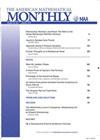A Derivation of the Infinitude of Primes
IF 0.4
4区 数学
Q4 MATHEMATICS
引用次数: 0
Abstract
AbstractThe well-known analogy between polynomials and integers breaks down when it comes to considering the polynomial derivative. This is rather unfortunate since derivatives are a powerful tool for doing arithmetic with polynomials. Nevertheless, there are some proposals in the literature for arithmetic analogues of derivatives. In this article we use one of these arithmetic derivatives to give a proof of the infinitude of primes which is analogous to an argument that will be presented for polynomials using polynomial derivatives. We hope that this “differential” proof of the infinitude of primes will help to motivate the reader to look for good notions of arithmetic derivatives.MSC: 11A4111C08 ACKNOWLEDGMENTThis article was possible thanks to the support of ANID Fondecyt Regular Grants 1190442 and 1230507 from Chile. I thank Ricardo Menares and Natalia Garcia-Fritz for valuable feedback on a first version of this article. I also thank the referees and editors for numerous suggestions.Additional informationNotes on contributorsHector PastenHECTOR PASTEN is a Chilean mathematician. He studied at Universidad de Concepción under the supervision of Xavier Vidaux (Chile, 2010) and at Queen’s University under the supervision of Ram Murty (Canada, 2014). Then he was a Benjamin Peirce Fellow at Harvard University (2014-2018). During this period he was also a visiting scholar at the Institute for Advanced Study at Princeton (2015-2016). In 2018 he returned to Chile where he is now an Associate Professor at the Mathematics Department of Pontificia Universidad Católica de Chile. He is interested in number theory and its connections with mathematical logic and analysis.素数无穷性的推导
摘要当考虑多项式的导数时,多项式和整数之间众所周知的类比就失效了。这是相当不幸的,因为导数是用多项式做算术的强大工具。然而,在文献中有一些关于导数的算术类似物的建议。在这篇文章中,我们使用这些算术导数中的一个来证明质数的无穷,这类似于使用多项式导数来证明多项式。我们希望这个素数无穷的“微分”证明将有助于激发读者寻找算术导数的好概念。感谢来自智利的ANID基金会定期资助1190442和1230507的支持。感谢Ricardo Menares和Natalia Garcia-Fritz对本文第一版的宝贵反馈。我也感谢审稿人和编辑提供的众多建议。作者简介:hector PASTEN是一位智利数学家。他先后就读于universsidad de Concepción,师从Xavier Vidaux(智利,2010)和Queen 's University,师从Ram Murty(加拿大,2014)。2014-2018年任哈佛大学本杰明·皮尔斯研究员。在此期间,他还在普林斯顿高等研究院做访问学者(2015-2016)。2018年,他回到智利,现任智利教皇大学(Católica de Chile)数学系副教授。他对数论及其与数理逻辑和分析的联系感兴趣。
本文章由计算机程序翻译,如有差异,请以英文原文为准。
求助全文
约1分钟内获得全文
求助全文
来源期刊

American Mathematical Monthly
Mathematics-General Mathematics
CiteScore
0.80
自引率
20.00%
发文量
127
审稿时长
6-12 weeks
期刊介绍:
The Monthly''s readers expect a high standard of exposition; they look for articles that inform, stimulate, challenge, enlighten, and even entertain. Monthly articles are meant to be read, enjoyed, and discussed, rather than just archived. Articles may be expositions of old or new results, historical or biographical essays, speculations or definitive treatments, broad developments, or explorations of a single application. Novelty and generality are far less important than clarity of exposition and broad appeal. Appropriate figures, diagrams, and photographs are encouraged.
Notes are short, sharply focused, and possibly informal. They are often gems that provide a new proof of an old theorem, a novel presentation of a familiar theme, or a lively discussion of a single issue.
Abstracts for articles or notes should entice the prospective reader into exploring the subject of the paper and should make it clear to the reader why this paper is interesting and important. The abstract should highlight the concepts of the paper rather than summarize the mechanics. The abstract is the first impression of the paper, not a technical summary of the paper. Excessive use of notation is discouraged as it can limit the interest of the broad readership of the MAA, and can limit search-ability of the article.
 求助内容:
求助内容: 应助结果提醒方式:
应助结果提醒方式:


